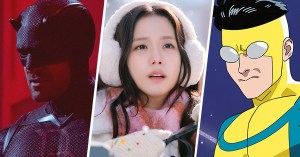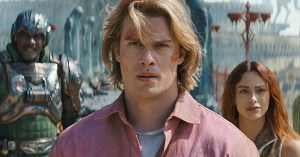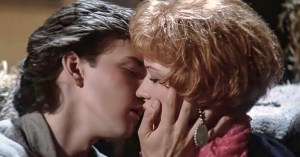Ryan Gosling On Drive: This Is My Superhero Movie
The star talks movie mythology, his childhood obsession with Rambo, and why he loves working with director Nicolas Winding Refn.
Thanks to the unlikely combination of valiantly dispersing New York street fights and starring in one of the year’s best movies (hint: it’s not Blue Valentine), Ryan Gosling has not only emerged as movies’ man of the moment — he’s also, at long last, apparently comfortable in becoming a genuine (and not just for The Notebook) star.
In Drive, director Nicolas Winding Refn’s (Bronson, Valhalla Rising) neo-noir thriller, Gosling plays an enigmatic outsider known only as “Driver,” a Hollywood stunt jockey who moonlights as a getaway wheel man for a local crime boss. Co-starring Carey Mulligan and Albert Brooks, the film is a genre piece that evokes a long-gone era of car movies, with obvious antecedents like Walter Hill’s The Driver and William Friedkin’s To Live and Die in L.A. mixed with the dirty neon of a little-seen modern Los Angeles (Thom Anderson would approve) and set to a pulsing electronic score from Cliff Martinez and Johnny Jewel.
We met with Gosling — who looked like he’d just stepped straight off the electric pastel poster for his movie — for a chat about Drive and working with Refn.
RT: You said that since everyone’s been doing a superhero movie you thought, “Why not do one?” Have you been approached to do superhero movies?
Ryan Gosling: Yeah.
Many times?
Mmm-hmm, yep.
But Drive ended up being the superhero movie for you?
This is the one. I wanted to make this one. I didn’t always know I was gonna get to make it, but I did.
What was it about the film? Had you read the script when Hugh Jackman and director Neil Marshall were attached to make it?
I think that might be the original one I read. I read a few drafts. I read one as well where he wasn’t a stunt driver at all, which was a newer draft — maybe that’s the one Hugh Jackman had; I’m not sure exactly. Basically when I read it, in trying to figure out who would do something like this, the only way to make sense of this is that this is a guy that’s seen too many movies, and he’s started to confuse his life for a film. He’s lost in the mythology of Hollywood and he’s become an amalgamation of all the characters that he admires.
I could relate to that because back when I was a kid, when I first saw First Blood, it kind of put a spell on me and I thought I was Rambo. I went to school the next day and I put all these knives in my Fisher-Price Houdini kit and I f**king threw them at all these kids at recess, and I got suspended. I didn’t hit any kids and I didn’t hurt anybody, thank god, but my parents were like, “You can’t watch violent movies anymore.” They were careful about what they showed me because [movies] really did have a big impact on me. They said I could only watch Bible movies and National Geographic films, but those are really f**king violent, you know [laughs] — but I could see where they were going.
So I connected to the film that way — in that films can cast spells. And cars can as well, because you get in a car, and you get out, and you don’t remember the trip, you know? There’s also something about cars where you can really put your identity in the driver’s seat: no one’s watching you, so you don’t have to be self-conscious — you can just watch. I can put a kind of spell on you. So the idea of movie mythology and the idea of the car being a vehicle to take you in to someone’s subconscious felt like there was a possibility for a kind of a superhero film, about a guy who wants to be a superhero.
On a side note, I always wanted to see a violent John Hughes movie. I love John Hughes, but if there was a head smashing in Pretty in Pink, then it would be perfect. [Laughs]
How did this recall a John Hughes movie for you?
It became that once we started thinking. It wasn’t that initially. The original script was much more authentic to Los Angeles gang culture and the reality; it was more realistic. We wanted this to be more of a fairytale, like a Grimm brothers fairytale, so we had to change it. In the process of writing it we were talking about movies and for some reason we ended up talking about John Hughes movies and, like, Purple Rain. There’s something about this character: he has cinematic ideas of romance, and he lives in a fantasy. And that’s what John Hughes movies are — they’re just all cotton candy and champagne. The movie needed that, but it also needed a little blood on the cotton candy, to give it balance. We used that as a guide.
You got to personally choose Nicolas as the director — a guy who also explored the blurring of character and mythology recently in Bronson and Valhalla Rising. What was it about him that made you feel he was right for this film?
He fetishizes the frame. Everything in the frame has to physically turn him on, and if it doesn’t, he won’t shoot it. So he makes very personal films, because he only shoots what he wants to see. His movies have a real identity, and he won’t repeat himself. They’re movies that you want to see in a movie theater. You don’t wanna see them at home. You know, in Valhalla Rising, when One Eye cuts the guts out of his friend and shows him his own guts, and everyone starts freaking out and hitting each other and laughing and they don’t know how to feel — you wanna be in a theater to experience that. I wanted this movie to be a film you wanted to see in a movie theater, and I think those are the kinds of films that he makes. I also feel like he and I were sharing the same dream, and kind of continue to — so I could fight for his inability to make anything that’s not personal, because it’s also personal to me.
Drive opens in US theaters this week, September 23 in the UK, and October 27 in Australia.






